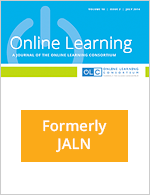Online Collaboration: Introduction to the Special Issue
A wide range of theoretical and empirical analyses emphasize the importance of active participation and collaboration among students in promoting the effectiveness of online learning. Collaboration models activity in the workplace, helps students to actively construct knowledge, enhances students' understanding and appreciation of diversity, and may give students a sense...

